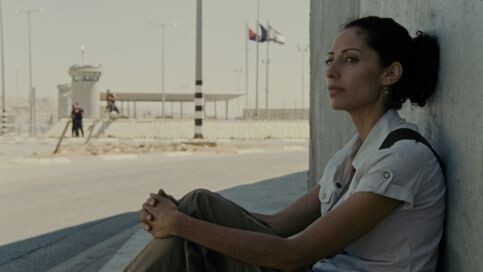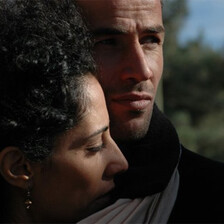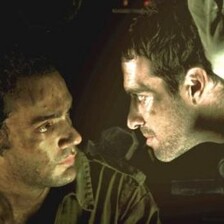The Electronic Intifada 11 August 2010

Suheir Hammad in Salt of This Sea
Salt of This Sea (2008), Annemarie Jacir’s groundbreaking feature film, premieres in the US this week after two years on the road and winning over 20 awards in countless international film festivals. An intimate portrayal of the complexity of Palestinian identity, from the exiled diaspora to the ghettos of the West Bank, Salt of This Sea continues to make waves across the world since its debut at Cannes in 2008 — where it was featured as an Official Selection/Un Certain Regard. The challenges and dangers of making the film mirrored many of the realities it tried to portray — settlers tried to run actors over, and the Israeli army drove in with real tanks as a scene with a prop tank was being filmed.
Award-winning Palestinian-American poet Suheir Hammad plays Soraya, a woman who comes to Palestine for the first time in her life, curious about her roots and determined to redeem the ghosts that have haunted her family for three generations. Born in Brooklyn to a working-class Palestinian family exiled from Jaffa, Soraya discovers that her grandfather’s savings were frozen from his bank account during the Nakba — the expulsion of the Palestinians — in 1948, and the money was eventually absorbed by Israeli financial institutions.
Soraya meets Emad (played by Saleh Bakri) in Ramallah, a waiter aching to leave the confines of occupied Palestine completely. Interweaving their conflicting dreams based on finding their individual freedoms, together they compose a daring plan — a bank robbery — to recover the savings in an emblematic act of redemption.
From this point, the pair and another friend make their way across checkpoints into what is now Israel, to Soraya’s grandfather’s home in Jaffa — which like the property of hundreds of thousands of other expelled Palestinians is now in the hands of an Israeli family — and eventually to the land of Dawayima, Emad’s ancestral village which lies today in ruins. Part road movie and adventure, the physical journey mirrors the characters’ struggle to find their places in a forbidding and unwelcoming landscape.
In her director’s notes, Jacir explains that Salt of This Sea “is a story about young people trying to shake off the restraints that control them — of military occupation, of borders, of a corrupt government and of a social system that rejects them. Is it the story of a new generation wanting to live and knowing that sometimes, in order to do this, one has to take things in their own hands.”
This Friday, 13 August, Salt of This Sea opens in New York City and will be shown in independent theaters across the country. Hammad was interviewed by her longtime friend, journalist Nora Barrows-Friedman for The Electronic Intifada.
Electronic Intifada: I was staying with you in Ramallah when the film was being made in 2007. You were saying then that the fundamental process of filming was undoubtedly a reflection of the chaos that envelops every waking moment in occupied Palestine. Say a little more about what you meant.
Suheir Hammad: It was probably too dangerous in some ways, but wouldn’t have been made if Annemarie (Jacir) especially didn’t charge ahead. There were settlers who tried to run me over in their cars while we were filming in the street. There was the night the Israelis brought a tank into Ramallah deep at night, while we filmed a scene with a prop tank.
EI: You’re a poet. And this was your first acting role on film. Even though you perform in public often, and have for many years now, how much of a challenge was it to cross over from verbal to visual representation of an entire character — a role on film?
SH: It was trial by fire. And I think now, a few years later, of the patience we all needed from one another in such a situation. My first day of filming was on a hot day in the middle of a busy Ramallah street. My friends know I play tricks on myself when onstage to forget that I’m being looked at. You can’t do that when hundreds of people are stopped and watching a film being shot. I had to learn to “look through the camera.”
EI: Some reviewers in the US, who aren’t familiar with the political nuances of Palestinian diasporic identity have characterized Soraya as stubborn, naive, angry, or full of misplaced aggression. I think many miss the point of her time in Palestine, and many miss the tenderness and impassioned bond that she makes between Emad, her friends, her sense of place, and her history. How do you fit all of the angles of Palestinian identity into one character, and what for you was the most important way to show all of the overlapping emotions Soraya had?
SH: Well, I had to break myself. Soraya’s language, heart, and in many ways her dreams, are broken. I can relate to this.
EI: There are so many ways in which the West has unfairly — to put it mildly — portrayed Arab women on film. You have a strong current running through your own work as a poet challenging those entrenched racist and sexist stereotypes. Which features of Soraya’s character, her own ferocity, her own determination and individuality, spoke to you the most, and why?
SH: You know, given the economic reality so many working women face in the US, I feel more like Soraya today than I did yesterday. The character was created by Annemarie and shaped by us both, but I think every woman we’ve ever met has been reflected in her.
EI: There is a scene in which Soraya confronts the Jewish-Israeli peace activist-artist living in the house that was built by her (Soraya’s) grandfather in Jaffa. It is a very visceral and painful scene, because it embodies the core reason for Soraya’s circumstances — why she was born outside of Palestine, why she decided to come back, and why the house remains “off-limits” to the indigenous inhabitants. I’ve watched people bristle while talking about that scene. People have said that the Israeli woman was also a victim of her circumstance, and it was hard to sympathize with Soraya’s directed anger. But this scene, for me, is one of the most important scenes on film about Palestine ever made. Tell us about your process in this scene, and what it represents.
SH: Soraya could have really gotten angry, and she didn’t. And I think audiences have responded in a spectrum to that scene. I always think it’s interesting that it takes place in the kitchen. For two women to talk in any kitchen, given the historical roles in the home, is interesting and layered — the kitchen as home and hearth.
EI: The film opens up in theaters across the US, at a time of deepening political and humanitarian despair in Palestine. What are you hoping that Americans understand from Salt of This Sea?
SH: A movie won’t make any of us kinder, fairer people. But for over an hour, in the dark, the audience is invited to listen to the sounds of Palestine’s streets, and view her landscape through the eyes of Soraya, who loves a place she’s never been to. Instead of the the steady toxic imagery we are used to coming to represent the Palestinian people, they get to represent themselves.
EI: Could the political story of Palestine be its own character in the film?
SH: I always say, Palestine, the land, sea, the nature of the place, is the star of the movie.
EI: You’ve won awards for your role as Soraya. Would you consider acting again?
SH: I think now all artists should try all art. That said, most of what is produced and consumed as art, poem or film, doesn’t fit my unique definition. I will keep working on my craft.
Nora Barrows-Friedman is an award-winning independent journalist, writing for The Electronic Intifada, Inter Press Service, Truthout and other outlets. She regularly reports from Palestine, where she also runs media workshops for youth in the Dheisheh refugee camp in the occupied West Bank.
Related Links




